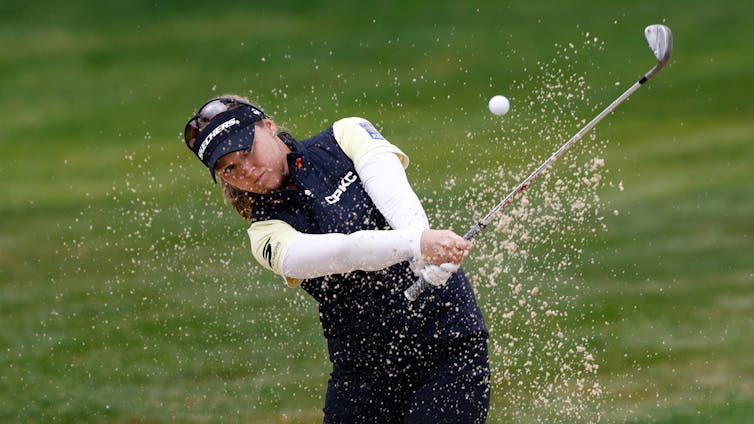The rolling, green-grassed Emerald Valley Golf Club course in Creswell tees off right outside of Sam Hahn’s office window.
But the co-CEO of L.A.B. Golf, a boutique company that sells uniquely shaped putters to any golfer who can afford the $400 starting price tag, doesn’t always get to enjoy the view.
“It’s a little distracting,” he says. “That’s why I close the middle blinds.”
His dedication to the work has paid off for his company, which sold a majority stake to private-equity firm L Catterton in a deal that valued the company at more than $200 million.
Hahn will soon step down as co-CEO in a few months, he said, instead assuming the role chief innovation officer. Robert Johnson, the company’s other chief executive, will take over.
It’s a far call from L.A.B.’s beginnings. When Hahn took over in 2018, he said, the company was close to going under.
It was founded by Bill Presse, who invented the putter’s technology that largely eliminates torque, which is a golf club’s resistance to twisting during a swing.
Hahn heard about the troubles facing the company then known as Directed Force and wanted to help. Appointed chief executive, he changed its name to L.A.B. — which stands for Lie Angle Balance — and moved the company from Reno, Nevada, where the company was originally founded, to Eugene.
In 2019, friends and family pooled together $500,000 that kept the company afloat.
At its Eugene headquarters, L.A.B. grew to eight employees. The head count grew to around 20 when it moved to Creswell in 2022. Now, it has 250 employees.
L.A.B. Golf’s headquarters are based in Creswell. On this floor, workers quality control putters.Tristin Hoffman/The Oregonian
Its growth, Hahn said, could have come from his and Presse’s unique approach at a sales pitch. They took their putters directly to customers online — sometimes adversarially.
“The only way that Bill and I knew how to sell putters was just by arguing with people on golf forums on Facebook,” Hahn said.
It’s that very mindset that landed L.A.B on the map, said Johnny Wunder, Golf.com’s director of equipment.
“He is a boots on the ground CEO,” Wunder said. “He’s in the mix with the consumers, talking in the marketing, interacting. He’s engaged.”
Lucas Glover won several PGA Tour tournaments in 2023 using a L.A.B. putter, catapulting the company further into fame and high demand.
But conversations with potential investors went nowhere.
Initial talks this year with L Catterton fell to a complete stop for six weeks after Trump’s warnings of high tariffs began in March, worrying Hahn more.
In June, J.J. Spaun threw his L.A.B. putter into the air seconds after winning the U.S. Open.
Soon, Hahn was celebrating, too. A month later, L Catterton closed its purchase of L.A.B. after seven months of negotiations.
“It was totally mortifying,” Hahn said, “and so intense for so long that even after it closed, it was two weeks before any actual joy emerged.”
Business deals like this don’t happen in Creswell, Hahn cautions. It’s a central Oregon town shy of 6,000 people, overshadowed by Eugene’s sprawling city of 178,000. Locals flock to the company’s headquarters anytime a professional golfer, like Adam Scott, flies in to test a putter.
The question on Hahn’s mind in recent years, however, was whether the company he took over in 2018 would grow out of what he called its “underdog status” and into an internationally recognized and operated company.
With the L Catterton money, Hahn says, the company will hire more executives to expand L.A.B. into international markets and golf courses.
It will also ramp up its production. The company has nearly 40,000 putters on order that have yet to be produced, according to Kevin Martin, lead mechanical engineer, and Hahn. The factory currently makes 30,000 each month at its Creswell headquarters.
“We figured we’d be about half this big,” Martin said. “To be the size we are and the public demand for the product is just insane.”
An employee quality checks one of L.A.B.’s putters. The company manufactures around 30,000 putters monthly at its Creswell headquarters.Tristin Hoffman/ The Oregonian
Hahn and Martin said quality wouldn’t change, pointing to resources they said would afford more employees and time to quality-check.
Around 85% of L.A.B.’s sales come from the United States, Martin said. Now, company leaders are working through how and where to expand. Japan or Korea top the list as to where the company could branch off some of its production to. They’re eyeing Asia and Europe for more sales.
Back in Creswell, L.A.B.’s success has spilled over onto the town. Laine Wortman, general manager of Emerald Valley Golf Club, the club outside of Hahn’s office, said the professional golfers and influencers L.A.B. has attracted to its headquarters often stick around after fittings to play nine holes with club members.
“Fortunately for us, most of their stuff they’re doing is on our golf course,” Wortman said. “So we get a lot of secondhand love from L.A.B. promoting their stuff.”
Hahn said it wouldn’t have happened anywhere else.
“Being the weirdos that we are is what made L.A.B. what it is,” Hahn said. “It just wouldn’t have worked anywhere else in the world.”
Please send questions or comments about this story to Business & Economy editor Elliot Njus at enjus@oregonian.com.
If you purchase a product or register for an account through a link on our site, we may receive compensation. By using this site, you consent to our User Agreement and agree that your clicks, interactions, and personal information may be collected, recorded, and/or stored by us and social media and other third-party partners in accordance with our Privacy Policy.






